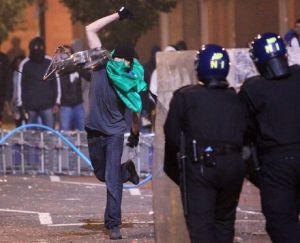LONDON: The torched skeletons of burnt-out buildings, a red double-decker bus in flames and looters forming orderly queues to pile TV plasma screens into their trollies – the images of the
2011 London riots tell their own story.
2011 London riots tell their own story.
With less than a year to go until London plays host to the 2012 Olympics, and the police in turmoil following recent top-level resignations, these were the last pictures anyone in authority would have wished to see.
But while the images are compelling, easy answers about what lies behind the seemingly sudden eruption of angry, and uninhibited, violence in the British capital, are harder to find.
Comparisons have been made with the 1980s, when the Thatcher era became synonymous with the riots on the Broadwater Estate in Tottenham, north London, and in Brixton, in the south.
This weekend’s youth riots started in Tottenham, a deprived, mixed-race neighbourhood, following the death of a suspected criminal and drug dealer in a police sting operation in which shots were fired.
As the death of Mark Duggan, 29, is under investigation, reports said yesterday that doubts had been cast on the initial police statement that the 29-year-old, though carrying a gun, had died in an exchange of fire.
Most analysts agree, however, that the echoes of history, while clearly a part of the overall complex picture, do not provide a satisfactory answer to the latest violence that spread to other parts of London late Sunday.
David Lammy, a leading Labour politician who represents the constituency of Tottenham in the British Parliament, said the “heart had been ripped out” of the community by the violence.
Wake-up call
Lammy, who was born to Guyanese parents in Tottenham, was adamant yesterday that the disturbances were not racially motivated, and that the vast majority of citizens rejected the violence.
Lammy, who was born to Guyanese parents in Tottenham, was adamant yesterday that the disturbances were not racially motivated, and that the vast majority of citizens rejected the violence.
“I lived through the festering tensions of the 1980s… I lived through the riots that sprang from that tension. I grew up fearful of the police because they stopped and searched me so often,” he wrote in an article in the Times yesterday.
Claudia Webbe, a social worker who helped set up Operation Trident, a police unit aimed at combating drug-related gun crime, said there were no easy answers to what happened in Tottenham and other parts of London over the weekend.
“There are multiple reasons and there will have to be multiple answers. This is a wake-up call to society,” she said. While there was “no one single solution or underlying cause” to the riots, it was
clear that tensions had arisen over issues ranging from the economy to social deprivation and policing.
clear that tensions had arisen over issues ranging from the economy to social deprivation and policing.
“Those who attacked the police directly were venting out on… inequality, decades of generational unemployment, poverty and police stop-and-search methods,” said Webbe, adding that she condemned the “thuggish criminality” that had been exposed.
Police said they were “shocked” at the “outrageous level of violence” displayed by the rioters, many of whom hid their faces beneath hoods or balaclavas as they proceeded from pelting officers with bricks and missiles to calmly looting shops.
The Daily Telegraph reported that looters formed “orderly queues” to ransack stores for computer, clothing and shoes, with one woman even seen fitting a pair of trainers for the right size.
Teenage gangs
Police, which were caught by surprise by the first night of rioting on Saturday, said they believe the protests were orchestrated by teenage gangs using the latest mobile technology to incite and film the looting and violence.
One Twitter user, named “Sonny Twag,” said: “Want to roll to Tottenham to loot. I do want a free TV. Who wouldn’t.”
The latest bout of rioting, preceded last December by violent student protests and anarchist destruction on the fringes of a trade union march earlier this year, comes at an awkward time for London’s beleaguered police force.
As the challenge of policing the Olympic Games looms, the authority of the Metropolitan Police has been badly dented in the wake of the recent phone-hacking scandal which prompted the resignation of the Scotland Yard chief and his deputy last month.
Meanwhile, London’s deputy mayor for policing, Kit Malthouse, said yesterday that London remained one of the “safest big cities on earth”.
“I think it is worth stressing that this is quite a small group of people within our community in London who have decided to perpetrate violence,” he said.









